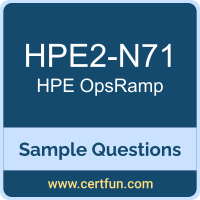 Getting knowledge of the Hewlett Packard Enterprise HPE2-N71 exam structure and question format is vital in preparing for the HPE OpsRamp certification exam. Our HPE OpsRamp sample questions offer you information regarding the question types and level of difficulty you will face in the real exam. The benefit of using these Hewlett Packard Enterprise HPE2-N71 sample questions is that you will get to check your preparation level or enhance your knowledge by learning the unknown questions. You will also get a clear idea of the exam environment and exam pattern you will face in the actual exam with the HPE OpsRamp Sample Practice Test. Therefore, solve the HPE OpsRamp sample questions to stay one step forward in grabbing the HPE ASE - Compute Solutions credential.
Getting knowledge of the Hewlett Packard Enterprise HPE2-N71 exam structure and question format is vital in preparing for the HPE OpsRamp certification exam. Our HPE OpsRamp sample questions offer you information regarding the question types and level of difficulty you will face in the real exam. The benefit of using these Hewlett Packard Enterprise HPE2-N71 sample questions is that you will get to check your preparation level or enhance your knowledge by learning the unknown questions. You will also get a clear idea of the exam environment and exam pattern you will face in the actual exam with the HPE OpsRamp Sample Practice Test. Therefore, solve the HPE OpsRamp sample questions to stay one step forward in grabbing the HPE ASE - Compute Solutions credential.
These Hewlett Packard Enterprise HPE2-N71 sample questions are simple and basic questions similar to the actual HPE OpsRamp questions. If you want to evaluate your preparation level, we suggest taking our HPE OpsRamp Premium Practice Test. You might face difficulties while solving the real-exam-like questions. But, you can work hard and build your confidence on the syllabus topics through unlimited practice attempts.
Hewlett Packard Enterprise HPE2-N71 Sample Questions:
01. What primary challenge does OpsRamp address for IT teams?
a) Managing data growth in legacy storage systems
b) Providing unified visibility and management across hybrid IT environments
c) Ensuring compatibility with proprietary hardware solutions
d) Simplifying hardware procurement processes
02. Why might legacy systems benefit from OpsRamp?
a) It enables seamless integration with modern cloud tools
b) It removes the need for on-premises IT staff
c) It replaces hardware components with virtualized solutions
d) It eliminates network latency
03. How does process automation enhance incident management in OpsRamp?
a) By suppressing low-priority incidents
b) By automatically escalating unresolved alerts
c) By restricting incident data visibility
d) By disabling workflow orchestration
04. What criteria should be considered when choosing a PoD in OpsRamp?
(Select two.)
a) Geographic location of the workload
b) Compatibility with legacy systems
c) Scalability for future workload growth
d) Cost of the underlying hardware
05. What integration capabilities does OpsRamp offer?
(Select two.)
a) Real-time monitoring integration with third-party tools
b) Centralized configuration for all integrations
c) Support for legacy manual scripts only
d) Data migration automation
06. Which feature of OpsRamp most directly helps organizations reduce downtime?
a) Synthetic monitoring
b) Hardware lifecycle tracking
c) Manual patch management
d) Hardware procurement automation
07. How does OpsRamp ensure secure access to dashboards?
a) By automating login credentials
b) By enabling user-specific views through RBAC
c) By limiting access to a single administrator
d) By requiring third-party authentication for all users
08. What automation capabilities does OpsRamp provide?
(Select two.)
a) Automated alert suppression
b) Workflow-based remediation of incidents
c) Limiting monitoring to specific devices
d) Scheduled patch deployment
09. What business challenges does OpsRamp address?
(Select two.)
a) Fragmented IT visibility
b) Manual server provisioning
c) Hardware replacement planning
d) Decentralized incident response
10. Which are key components of an OpsRamp deployment?
(Select two.)
a) PoDs for workload isolation
b) Synthetic monitoring tools
c) Gateway setup for data flow management
d) Manual server provisioning systems
Answers:
|
Question: 01 Answer: b |
Question: 02 Answer: a |
Question: 03 Answer: b |
Question: 04 Answer: a, c |
Question: 05 Answer: a, b |
|
Question: 06 Answer: a |
Question: 07 Answer: b |
Question: 08 Answer: b, d |
Question: 09 Answer: a, d |
Question: 10 Answer: a, c |
Note: For any error in HPE OpsRamp (HPE2-N71) certification exam sample questions, please update us by writing an email on feedback@certfun.com.
